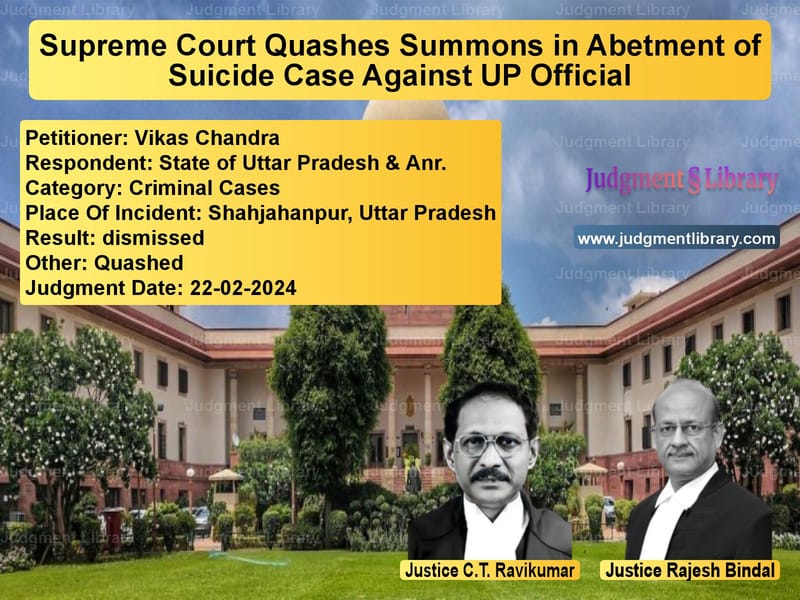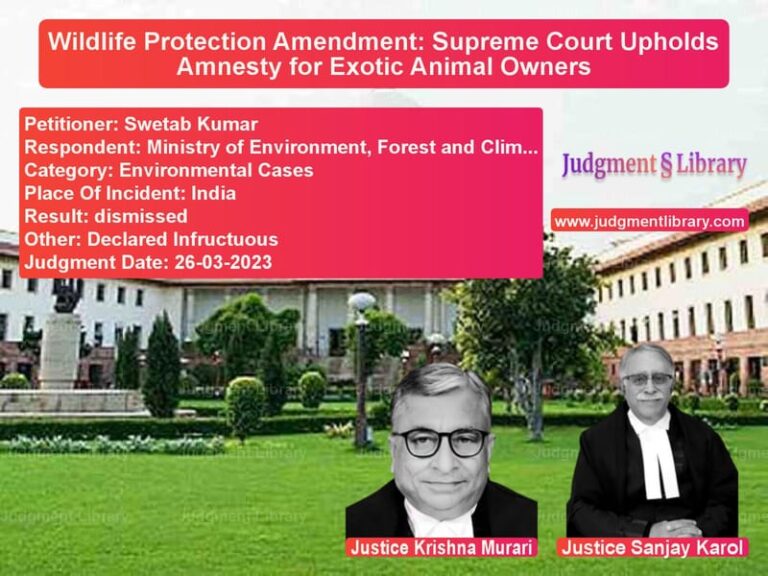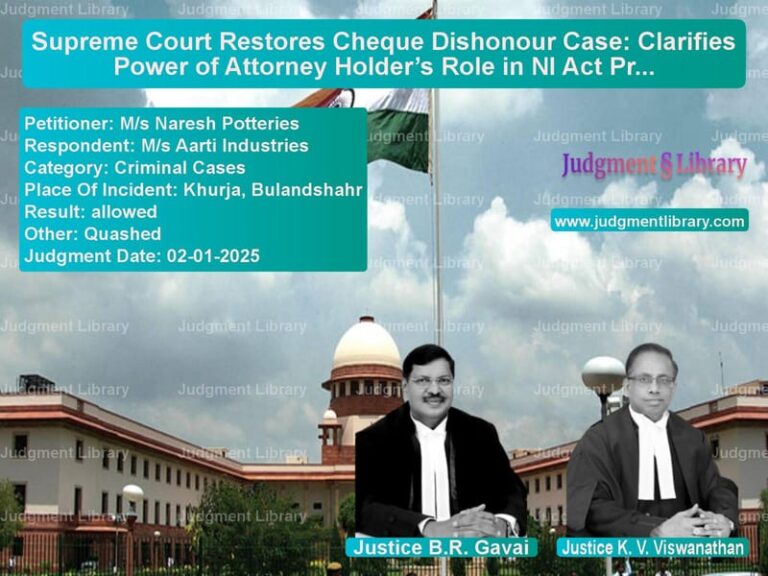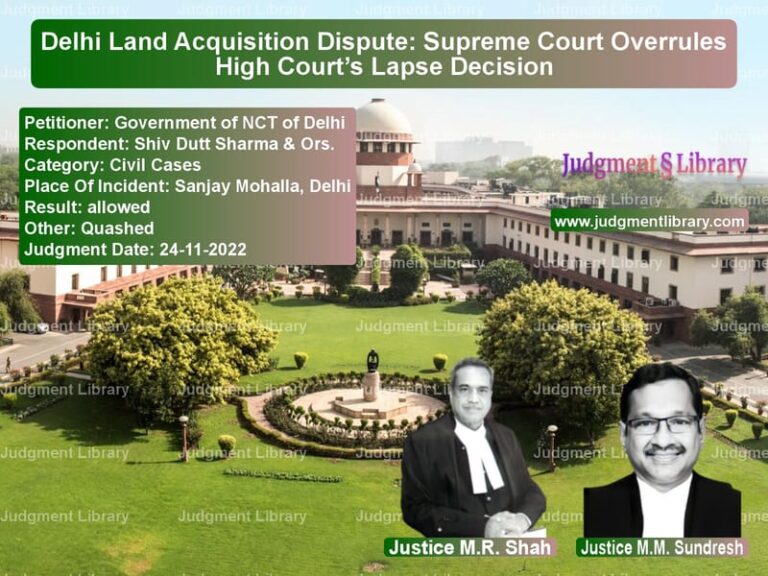Supreme Court Quashes Summons in Abetment of Suicide Case Against UP Official
The Supreme Court of India recently adjudicated a significant case concerning the summoning of a government official under Section 306 of the Indian Penal Code (IPC) for alleged abetment of suicide. The judgment, delivered by Justices C.T. Ravikumar and Rajesh Bindal, reaffirmed the principle that summons in criminal cases must be issued only after due application of judicial mind.
Background of the Case
The case arose from the suicide of Brijesh Chandra, a retired military man and an employee of the Mandi Samiti, Uttar Pradesh. His son, Vikas Chandra (the appellant), alleged that the deceased took his life due to non-payment of salary and harassment by Ram Babu Sharma (respondent no. 2), the then Secretary of the Mandi Samiti.
According to the appellant, on October 12, 2004, his father approached the respondent for his pending salary. The respondent allegedly told him:
“I will see that how will you get your salary and who will help you in getting your salary, I will bring out your military-man-ship and either you die or your children, but I do not care, get out of here, why you do not take poison.”
The appellant claimed that this incident deeply disturbed his father, leading him to commit suicide on October 23, 2004, at his workplace, after leaving a suicide note.
Legal Proceedings and Summoning of the Accused
Following the incident, the appellant initially filed a complaint, but it was not forwarded for investigation. After pursuing legal recourse, an FIR (No. 107/2005) was registered under Section 306 IPC. However, the investigating agency submitted a closure report under Section 173(2) of the Criminal Procedure Code (CrPC), concluding that there was no evidence of abetment.
Disagreeing with the closure report, the appellant filed a protest petition. The Magistrate conducted an inquiry under Section 202 CrPC and issued summons to the respondent on April 5, 2012. The respondent challenged the summoning order before the Allahabad High Court, which quashed it, prompting the appellant to move the Supreme Court.
Supreme Court’s Observations
The Supreme Court upheld the High Court’s decision, holding that the summoning order lacked proper judicial reasoning. The Court made the following key observations:
- While a Magistrate is not bound to accept a closure report and can issue summons, the order must reflect due application of mind.
- The Court reiterated that summoning an accused is a serious matter affecting their life and liberty. Therefore, it cannot be done mechanically.
- The alleged instigating words were spoken 11 days before the suicide. The gap between the incident and the act of suicide was too long to establish a direct link.
- The suicide note merely stated that the accused was responsible for the suicide but did not detail any continuous harassment or specific abetment.
- There was no evidence suggesting a consistent pattern of coercion that left the deceased with no option but to take his life.
The Court emphasized:
“There must be explicit or implicit abetment or some overt act indicative or suggestive of fact that some instigation was given for committing suicide and the applicant was having an interest in it.”
Legal Implications
This ruling reinforces the principle that summoning an accused must be backed by clear and specific allegations that prima facie establish the offense. It underscores that mere allegations or a suicide note holding someone responsible do not suffice for issuing summons under Section 306 IPC.
Conclusion
The Supreme Court’s decision highlights the need for judicial scrutiny before proceeding against an accused in criminal cases. By quashing the summoning order, the Court ensured that the criminal justice process remains fair and does not become a tool for harassment based on unsubstantiated claims.
Petitioner Name: Vikas Chandra.Respondent Name: State of Uttar Pradesh & Anr..Judgment By: Justice C.T. Ravikumar, Justice Rajesh Bindal.Place Of Incident: Shahjahanpur, Uttar Pradesh.Judgment Date: 22-02-2024.
Don’t miss out on the full details! Download the complete judgment in PDF format below and gain valuable insights instantly!
Download Judgment: vikas-chandra-vs-state-of-uttar-prade-supreme-court-of-india-judgment-dated-22-02-2024.pdf
Directly Download Judgment: Directly download this Judgment
See all petitions in Bail and Anticipatory Bail
See all petitions in Fraud and Forgery
See all petitions in Judgment by C.T. Ravikumar
See all petitions in Judgment by Rajesh Bindal
See all petitions in dismissed
See all petitions in Quashed
See all petitions in supreme court of India judgments February 2024
See all petitions in 2024 judgments
See all posts in Criminal Cases Category
See all allowed petitions in Criminal Cases Category
See all Dismissed petitions in Criminal Cases Category
See all partially allowed petitions in Criminal Cases Category







